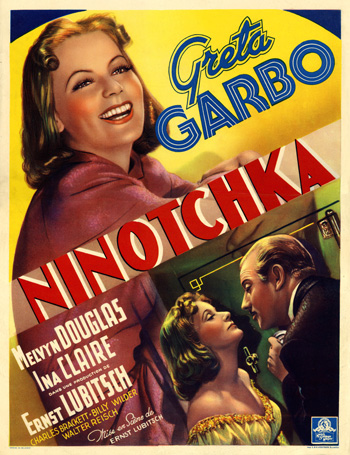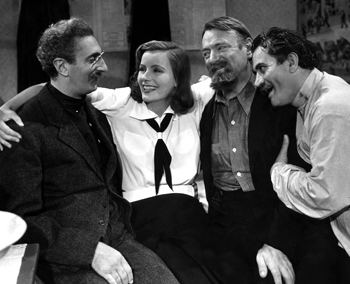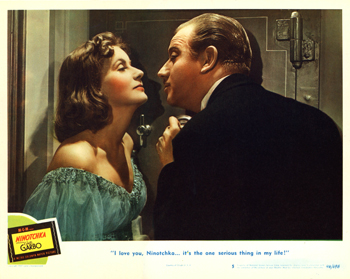 |
||||||||||

Ninotchka must have seemed an especially bittersweet charmer in 1939, with World War II breaking out in Europe. Director Ernst Lubitsch and his screenwriters (including Billy Wilder) acknowledge as much with their introduction:
“This picture takes place in Paris in those wonderful days when a siren was a brunette and not an alarm… and if a Frenchman turned out the light it was not on account of an air raid!”
Later in the picture, Comrade Yakushova (Greta Garbo), giddy with first champagne and new romance, pleads for lovers everywhere:
“Comrades, people of the world, the revolution is on the march, I know. Bombs will fall. Civilization will crumble. But not yet, please! Wait—what’s the hurry? Give us our moment. Let’s be happy!”
If only movies had the power to prevent wars.
Today, though the end of the Cold War may have muted the specifics of this film’s comedy, its make-love-not-war spirit remains just as relevant—and captivating. At least we can still visit “those wonderful days” via the movies (whether they ever really existed or not) and keep hoping someday the world may yet find its sanity.
Comrade Yakushova, aka Ninotchka, is a communist emissary sent to Paris to check up on those rascals Iranoff, Buljanoff, and Kopalski, who’ve been distracted from their mission, selling the Romanoff jewels, by the pleasures of the capitalist world. The dour Yakushova arrives to find these three lovable buffoons have rationalized themselves right into the Royal Suite at a four-star hotel! It was, after all, the only place with a safe big enough to hold the jewels—never mind the pretty French maids available at three rings of a bell. Though she at first appears about as susceptible to charm as granite, Ninotchka soon finds even she can’t resist the silly, sinful temptations of Paris, from frivolous, impractical hats to the sweet, seductive kisses of Count Dalga (Melvyn Douglas). He shows her that there’s more to romance than chemistry, and as much to be said in favor of beauty and pleasure as practicality.
Today, the movie plays like a metaphor for the fall of Communism; for better or for worse, the pleasures of the free market world are finally irresistible!
Ninotchka is one of director Lubitsch’s most enduring and delightful comedies (see also The Love Parade, Trouble in Paradise, Angel, The Shop Around the Corner, To Be Or Not To Be). The famed “Lubitsch touch” meant sex and sophistication and is well demonstrated here. Note the giddy scene in which Ninotchka pleads to pay the penalty for her decadence. With Count Dalga’s willing help, she’s stood up against the wall, blindfolded with a napkin, sentenced with a kiss, and executed with the pop of a champagne cork. And of course, the movie is full of caustic verbal wit (which to my ear has a definite Wilder ring). For example “The last mass trials were a great success. There are going to be fewer but better Russians.”
For movie fans, watching Ninotchka is a bittersweet experience as well, knowing it was the sublime Greta Garbo’s next-to-the-last film. At the time, it seemed to herald a new and promising direction for this famed dramatic actress’s career—comedy! Her great roles had all been in classy melodramas: Flesh and the Devil, Anna Christie, Grand Hotel, Queen Christina, Camille. Then, as the ads famously proclaimed, “Garbo laughs!” and she seemed vibrant and accessible as never before. Ninotchka was a hit. But her next picture, Two-Faced Woman, was a flop, after which she retired from the screen forever.
“Stalin won’t like it. Molotoff may even recall his envoy from Metro-Goldwyn-Meyer. We still will say Garbo’s Ninotchka is one of the sprightliest comedies of the year, a gay and impertinent and malicious show which never pulls its punch lines (no matter how far below the belt they may land) and finds the screen’s austere first lady of drama playing a dead-pan comedy role with the assurance of a Buster Keaton. Nothing quite so astonishing has come to the Music Hall since the Rockerfellers landed on Fiftieth Street. And not even the Rockerfellers could have imagined M-G-M getting a laugh out of Garbo at the U.S.S.R.’s expense.”—original New York Times review, 11/10/39
At right, Ninotchka memorabilia from the Teegarden/Nash Collection: A Belgian poster, movie still (Sig Rumann, Garbo, Felix Blessart, Alexander Granach), and lobby card (Garbo and Douglas).
—John Teegarden
This article originally appeared in Audience Magazine (AudienceMag.com).

